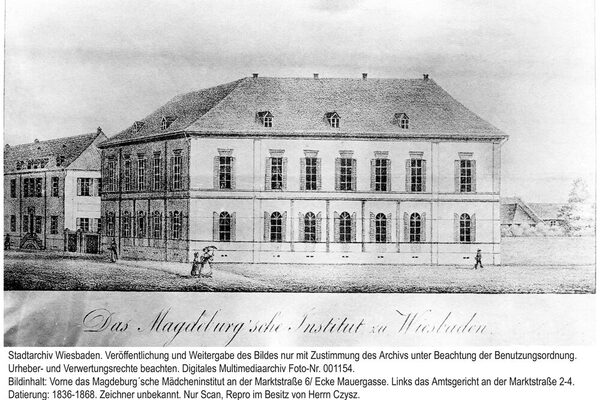Private schools
Private schools have a long tradition in Wiesbaden. In 1809, Johannes de Laspée founded a private school that taught according to Johann Heinrich Pestalozzi's method. Wilhelmine Magdeburg became a pioneer of women's and girls' education with her girls' institute founded in 1832. Other private schools for girls were also established. In 1893, the "English Misses" order of women established the St. Maria Institute, a grammar school for girls with university entrance, in villas at the entrance to Mainzer Straße that no longer exist today. The Englische Fräulein saw their task as the education and upbringing of girls out of Christian responsibility. This institute was closed by the National Socialists in 1939. The 19th century also saw the establishment of religious schools such as the Catholic Girls' School and the private religious school of the Israelite religious community. The EVIM founded a children's home in 1853, which also had a special school attached to it, the forerunner of today's Schule am Geisberg. A school was also attached to the Johannesstift for illegitimate pregnant girls, which was set up in 1907 on the initiative of a few ladies of high society. An example of an early private vocational school is the "Music-Paedagogicum" founded by Heinrich Spangenberg in 1888, which offered a wide range of musical training opportunities. From 1931, it was known as the Wiesbaden Conservatory.
These early examples of private schools in Wiesbaden represent what is now known as a supplementary school. Supplementary schools provide opportunities that the public school system does not offer and thus expand the diversity of schools. There are also privately-run alternative schools which - on the basis of a state permit - basically offer the same range of courses as public schools. As a result of the experience of the Nazi state, which enforced the standardization of all schools, the right to establish private schools was enshrined in the Basic Law of the Federal Republic of Germany. Since then, the number of pupils taught in private schools has gradually increased. Today, there are ten general education private schools in Wiesbaden: two special schools, one integrated comprehensive school, the Europa-Schule Dr. Obermayr with elementary school, grammar school and vocational school, two elementary school, one pure grammar school and two combined primary and grammar schools. The Agnes-Neuhaus-Schule, founded in 1983 in the Johannesstift, is a state-recognized school for educational assistance. As an alternative school, it guarantees the curricular implementation of the lessons planned for secondary level 1. The aim is to achieve reintegration into the public school system through individual help.
Since 2008, the Campus Klarenthal school, which was founded under the auspices of EVIM, has been operating on the site of the former Hessian Garden Academy. The approved alternative school is a reform pedagogical educational institution for children and young people from nursery age to A-levels. Founded in 1956, Europa-Schule Dr. Obermayr comprises an arts kindergarten, a Montessori elementary school, a bilingual grammar school as an all-day school, a secondary school branch and a vocational grammar school specializing in business. It also has six vocational schools specializing in languages, information technology and business. All schools are linked to European partner schools.
Founded in 2003 by the Wiesbaden Baptist congregation in the former "Haus Taunusfreunde" at Chausseehaus, Freie Christliche Schule Wiesbaden aims to offer a holistic education for mind, body and soul, with the principles of the Bible and values such as charity, gratitude and honesty guiding its educational work. The school is a recognized alternative school.
The Freie Waldorfschule Wiesbaden is a general education school from the 1st to the 13th grade in open all-day form. The children are taught according to the comprehensive school concept up to their respective qualifications. The qualifications, including the Abitur, are recognized by the state. The Humboldt School, founded in 1958, is a state-recognized grammar school. It was the first grammar school in Wiesbaden to develop an all-day program with differentiated supervision. Individual support for pupils is guaranteed through small learning groups. The school offers economics as an optional subject in the upper school.
Founded in 1992, the International School Wiesbaden is a branch of the Frankfurt International School, the largest international school in Germany. The school offers English-language, international and holistic school education for foreign and German children from the age of three to grade 6. From grade 7 onwards, lessons continue at the International School Frankfurt and culminate in the International Baccalaureate after grade 12. Multicultural school events promote integration as well as tolerance and appreciation for other cultures.
In 2014, another private school was opened, the private bilingual all-day school (PbG), which is gradually building up a secondary level 1. The initiative to found the Montessori School Wiesbaden came from the board and parents of the Elsässer Platz children's house. The school was also housed there in 1997 before finding a new home on the Freudenberg. The Schule am Geisberg is a state-recognized special school for educational assistance and for the sick. It also functions as a socio-educational counseling and support center. Founded in 1853 as a home-bound special school, today it increasingly also educates children who live at home.
In addition to the private schools mentioned here, there are also numerous private providers of vocational education and training.
Literature
Wiesbaden in the Biedermeier period (1818-1866). History of the City of Wiesbaden 5, Wiesbaden 1981.
